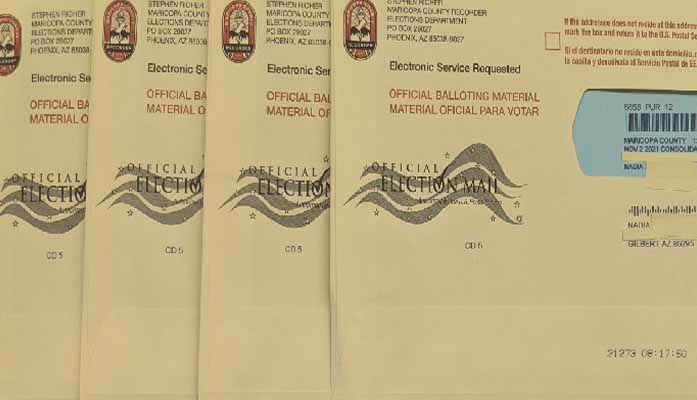
by Daniel Stefanski | Oct 13, 2024 | News
By Daniel Stefanski |
As early voting starts across Arizona, Republican and Democrat nominees for President, Vice President – and their surrogates – barnstormed the state to reach voters ahead of the pivotal contest.
Several major events are taking place across Arizona as the November General Election nears.
On Tuesday, Second Gentleman Douglas Emhoff touched down in Arizona to rally voters for his wife, the Democrat nominee for President, Kamala Harris.
During Emhoff’s event, protestors made their views known about the Israel-Hamas War.
U.S. House of Representatives Majority Leader Steve Scalise appeared with the Trump Campaign at a Phoenix rally to increase support for the Republican ticket.
On Wednesday, U.S. Senator J.D. Vance, the Republican Vice-Presidential nominee, stopped by the state, touching base with voters in Mesa and in Tucson.
Minnesota Governor Tim Walz, the Democrat Vice-Presidential nominee, also rallied supporters in Chandler and in Tucson on Wednesday.
Walz and Emhoff joined forces on Wednesday morning at a local cafe.
Harris was in Phoenix Thursday for a highly anticipated event.
The First Lady, Dr. Jill Biden, has announced plans to campaign for the Harris-Walz ticket over the weekend in the state.
Finally, Donald J. Trump, the Republican nominee for President of the United States, has scheduled a rally for Prescott Valley on Sunday.
Daniel Stefanski is a reporter for AZ Free News. You can send him news tips using this link.

by Staff Reporter | Oct 12, 2024 | News
By Staff Reporter |
Hundreds of Arizona’s children underwent sex change procedures from 2019 to 2023, according to data compiled by watchdog Do No Harm.
According to the organization’s database, there were nearly 80 total surgery patients, nearly 170 total hormone and puberty blocker patients, and over 1,400 prescriptions written for those patients: all amounting to over $1.7 million in charges.
At least 86 children underwent their sex change procedures at Phoenix Children’s Hospital: one received surgery and 86 received hormone and puberty blockers (HPB), all for the estimated price of over $121,700.
Phoenix Children’s Hospital didn’t make Do No Harm’s top 12 in terms of sex change procedures for minors. Those were, in order from number one to twelve: the Children’s Hospital of Philadelphia, Connecticut Children’s Medical Center, Children’s Minnesota, Seattle’s Children’s, Children’s Hospital Los Angeles, Boston Children’s Hospital, Rady Children’s Hospital (California), Children’s National Medical Center (Washington, DC), USCF Benioff Children’s Hospital Oakland (California), Children’s Hospital Colorado, UPMC Children’s Hospital of Pittsburgh, and Cincinnati Children’s Hospital Medical Center.
The following are the 42 medical facilities and providers that reportedly provided the sex change procedures to Arizona children (not including the categorization of an “independent facility” which covered 22 HPB patients). This data was pulled from the healthcare organization’s National Provider Identifier (NPI) record in the National Plan and Provider Enumeration System (NPPES):
- Tucson Medical Center: 6 surgery patients, 31 HPB patients
- HonorHealth Scottsdale Shea Medical Center: 23 surgery patients, 1 HPB patient
- Scottsdale Surgical Partners: 23 surgery patients
- HonorHealth Scottsdale Osborn Medical Center: 14 surgery patients, 1 HPB patient
- Mission Hospital Memorial Campus: 7 HPB patients
- Northwest Tucson Surgery Center LP: 6 surgery patients
- Banner University Medical Center Phoenix: 2 surgery patients, 3 HPB patients
- Arizona Community Surgeons PC: 4 surgery patients
- Northwest Medical Center: 2 surgery patients, 1 HPB patient
- HonorHealth Deer Valley Medical Center: 2 HPB patients
- HonorHealth John C. Lincoln Medical Center: 2 HPB patients
- Saint Alphonsus Regional Medical Center: 2 HPB patients
- Yuma Regional Medical Center: 2 HPB patients
- Abrazo Arrowhead Campus: 1 HPB patient
- Abrazo Central Campus: 1 surgery patient
- Arizona Urological Surgeons LLC: 1 surgery patient
- Banner Del E. Webb Medical Center: 1 HPB patient
- Banner Desert Medical Center: 1 HPB patient
- Banner Ironwood Medical Center: 1 HPB patient
- Banner Thunderbird Medical Center: 1 HPB patient
- Banner University Medical Center Tucson: 1 HPB patient
- Camp Lowell Surgery Center LLC: 1 surgery patient
- Cobre Valley Regional Medical Center: 1 HPB patient
- IU Health Methodist Hospital: 1 HPB patient
- Jason Daniel Johnson PLLC: 1 surgery patient
- La Paz Regional Hospital: 1 HPB patient
- Long Beach Medical Center: 1 HPB patient
- Maui Memorial Medical Center: 1 HPB patient
- Mayo Clinic Hospital Arizona: 1 surgery patient
- Mercy Gilbert Medical Center: 1 HPB patient
- Neurosurgical Associates LTD: 1 surgery patient
- Phoenix Indian Medical Center: 1 HPB patient
- Sagewest Riverton: 1 HPB patient
- Santa Barbara Cottage Hospital: 1 HPB patient
- Santa Cruz Valley Regional Hospital: 1 HPB patient
- Sina Inc.: 1 surgery patient
- St. George Regional Hospital: 1 HPB patient
- St. Joseph’s Hospital and Medical Center: 1 HPB patient
- St. Mary’s Hospital: 1 HPB patient
- Dr. Steven H. Turkeltaub: 1 surgery patient
- Valley Anesthesiology Consultants Inc.: 1 surgery patient
- White Mountain Regional Medical Center: 1 HPB patient
The Centers for Medicare and Medicaid Services (CMS) administers NPPES. NPIS are 10-digit numeric identifiers for provider transactions.
Per Do No Harm’s data, total procedures hit a peak in 2022 and declined slightly last year.
AZ Free News is your #1 source for Arizona news and politics. You can send us news tips using this link.

by Matthew Holloway | Oct 12, 2024 | News
By Matthew Holloway |
The long-awaited debate for the U.S. Senate Race in Arizona took place on Wednesday between Kari Lake and Congressman Ruben Gallego. And even the most mainstream of outlets took note, or took pains not to note, that Lake outperformed Gallego.
The Associated Press seemed to call out Rep. Gallego’s performance against Lake in a singular headline that read, “Lake’s Comfort And Polish In Front Of The Camera Stood In Contrast To Gallego.”
Jonathan Cooper and Gabriel Sandoval wrote for the wire, “Republican Senate candidate Kari Lake repeatedly reminded viewers Wednesday of her three-decade career on Arizona television, looking to harness the intimate connection she built with voters and overcome Democrat Ruben Gallego’s portrayal of her as a liar in the only debate of the closely watched race.”
“Lake’s comfort and polish in front of the camera stood in contrast to Gallego, a military veteran who occasionally tripped on his words. The hourlong forum, at times caustic and personal, highlighted big differences on immigration, border security, abortion and taxes.”
Detracting from her performance, the outlet noted that Lake didn’t pursue what was potentially the best attack avenue against Gallego far enough. It’s an angle President Trump has levied against Vice President Kamala Harris with great success: citing the Democrats’ current offices and asking why the changes they champion haven’t been made already.
“I haven’t had a vote in this; you’ve had a vote for 10 years,” she said.
The AP observed that Gallego focused on election integrity and Lake’s objection to the 2022 gubernatorial race results, bait that Lake refused to take. However, she did pivot to a strong argument on election integrity that Gallego was poorly equipped to answer.
“You know we’ve had problems across the country since 2000. One year the Democrats are mad, the next year the Republicans are,” Lake began. “We’ve got problems with our elections, and there’s no doubt about it. The people of Arizona have been burned. They’re tired of hearing about hiccups and loopholes and problems that happen on Election Day. We just want to make sure that our legal vote counts!”
She then zeroed in on Gallego: “My opponent wants illegal votes to count! He actually voted twice to have illegals vote. He voted against the SAVE Act, which would prevent illegals from voting. I want every legal vote to count. I don’t care if you are the most liberal Democrat or the most conservative Republican or where most of Arizona is: somewhere in between. I want every legal vote to count.”
Lake offered a solution to the matter of election integrity that will likely resonate with beleaguered Arizona voters fed-up with election-day mishaps for over a decade. “My solution would be: let’s get back to something closer to what we used to have: Election day, paper ballots, and we know the results right there on the night of the election. But we definitely can’t have people pouring across our country illegally voting. Not only does he want to let them vote, he wants to give them all asylum, and we’ve got to stop this nonsense at the border and restore our country.”
Even AZCentral, an outlet that has often proven openly hostile to Lake, seemed to de facto concede that Lake, in her confrontational, ‘take-no-prisoners’ debate style, successfully steamrolled Gallego. Bill Goodykoontz wrote in an editorial, “She followed the debate tactics (of) Donald Trump (her ‘good friend,’ she said) and repeatedly went over her time limit and talked over Gallego, often resorting to personal attacks. It was ugly. And she got away with it.”
Goodykoontz observed that though Gallego didn’t take the bait, he “didn’t respond as forcefully as he might have.” Further, Lake from the start, sought to classify Gallego as the “extreme makeover” candidate by drawing stark contrasts between his current talking points and his congression record, in lockstep with the Biden-Harris administration.
“Ruben Gallego has supported — every step of the way — Kamala Harris, the border czar, and Joe Biden’s open border,” she said.
While the New York Times’ Kellen Browning assessed that the debate may not have been a “knock out blow” to Gallego, the momentum generated by a dominant debate performance could move Lake back into striking distance of her opponent.
In polling per FiveThirtyEight, Gallego achieved several breakaways, carrying him into double digits over Lake, the most recent at the end of September. But in the past week, he has begun to hemorrhage his lead again from thirteen points in September, back down to seven. Should the cycle the two candidates have been locked in for months repeat, it will find Lake likely within margin of error by election day, if not overtaking the Democrat.
Matthew Holloway is a senior reporter for AZ Free News. Follow him on X for his latest stories, or email tips to Matthew@azfreenews.com.

by Daniel Stefanski | Oct 12, 2024 | News
By Daniel Stefanski |
Early voting has officially commenced across the crucial swing state of Arizona.
Arizona political parties are encouraging their voters to cast their ballots as early as possible as the pivotal election in November nears.
The Arizona Democratic Party posted, “ARIZONA: Early voting begins today & your mail-in ballot should arrive soon. We have so much at stake this election – from the presidency to flipping our Republican-controlled state legislature. Make a plan to vote…”
The Republican Party of Arizona stated, “Early Voting starts TODAY! Don’t wait – cast your vote early for President Trump and Republicans up and down the ballot. Check the status of your ballot and find a vote center near you at Arizona.Vote! EVERY. VOTE. COUNTS.”
The AZGOP also shared a video clip from a recent speech from Chair Gina Swoboda, where she encouraged listeners to vote by mail to avoid any potential issues at the polling locations.
Last week, the Arizona Libertarian Party alerted its followers on social media that early voting would soon begin.
Arizona Secretary of State Adrian Fontes also promoted the start of early voting in his state, encouraging interested individuals to visit Arizona.Vote “for all your Arizona election needs.”
In the Republican stronghold of Yavapai County, the Recorder there highlighted the beginning of early voting and shared a website for local voters to find locations and time to cast their ballots over the next month.
Additionally, the Pima County Recorder’s Office posted information about early voting in this southern Arizona jurisdiction, including for the 19 early voting sites under its purview.
Daniel Stefanski is a reporter for AZ Free News. You can send him news tips using this link.

by Matthew Holloway | Oct 11, 2024 | News
By Matthew Holloway |
After a stunning decision by the Arizona Supreme Court that will allow votes to be tabulated for Proposition 140, which would usher in ranked-choice voting, a coalition has formed to defeat the measure.
The NO on Prop 140 Committee, co-chaired by Pinal County Sheriff Mark Lamb and former Arizona Supreme Court Justice Andrew Gould, has launched a concerted effort to defeat the measure alongside organizations on both sides of the aisle including:
In a statement, Lamb and Gould said, “Special interest groups should not decide how our elections system operates. Arizonans on all sides of the aisle agree: this scheme to transform our elections into a system found in California is a bad idea. We oppose re-writing our Constitution and imposing such a radical, convoluted scheme on Arizonans.”
According to the Arizona Free Enterprise Club, one of the groups involved in the bipartisan coaltion, Prop 140 would do the following if enacted:
- “Allows one politician, the Arizona Secretary of State, to decide how many candidates qualify for the general election ballot for every single contest, including his or her own race
- Would result in some races where candidates from only one political party appear on the general election ballot
- Would force voters to navigate two completely different voting systems on the same ballot, with some races requiring voters to rank candidates and others that do not
- Will increase tabulation errors, create longer lines at the polls, and significantly delay election results.”
Matthew Holloway is a senior reporter for AZ Free News. Follow him on X for his latest stories, or email tips to Matthew@azfreenews.com.

by Matthew Holloway | Oct 11, 2024 | Education, News
By Matthew Holloway |
A former superintendent secretary with Yuma County’s Hyder Elementary School District, Nubia Gonzalez, has been indicted for Theft, Misuse of Public Monies, and Forgery. The indictment comes eight weeks after her arrest in Scottsdale in connection with an elaborate fraud scheme against the Cocopah Middle School Association of Parents and Teachers (APT).
A press release from the Arizona Auditor General revealed that Gonzalez has been indicted on allegations that in December 2020 she “embezzled $2,486 when, 3 months after she was terminated, an illicit District check in that amount was deposited in her business checking account.”
As reported by Fox10, court documents revealed that the Yuma County case “is currently with the AZ Attorney General’s Office,” however, Attorney General Kris Mayes’ Office replied to reports that the AG “cannot comment on this matter at this time.”
On July 3rd, Scottsdale Police received a report of suspected fraud from the president of the Cocopah Middle School APT. After returning from travel outside the U.S., the president had found the organization’s savings account emptied.
Per Fox10, court documents showed, “After she saw this, [the APT president] reached out to the former treasurer to ask her about the zeroed out accounts.” The documents noted also, “[the former treasurer] stated that she had no idea what had happened.”
The two APT officials reached out to the organization’s bank investigators. They discovered that the entire balance of the organization’s accounts had been wiped out in a series of withdrawals from their savings and checking accounts, linked to Gonzalez.
Police reported in the court documents that, “The total combined loss between both accounts was $36,512.09. Banking documents were obtained directly from Wells Fargo personnel, which showed Nubia Gonzalez signing each withdrawal slip.”
According to AZFamily, the group’s president said that Gonzalez was elected as treasurer in April and was given control and signing authority over the group’s accounts at Wells Fargo bank. Only the two of them had access. The authorities said, “It became readily apparent” that the suspect “immediately withdrew the money,” once the president had left. On the same day, Gonzalez reportedly deposited $22,300 into her personal checking account which she subsequently used to pay her own bills including “credit cards and other various accounts.”
The court documents described that Gonzalez allegedly told the president she was moving the group’s funds to a higher-yield interest bearing account, however, none was created per the bank. She reportedly sent doctored screenshots and forged documents supporting this claim.
The authorities wrote, “This was a well-thought out fraud scene, which involved counterfeit and forged banking documents.”
The board members promptly voted to remove Gonzalez from her position as treasurer. She later turned herself in following media reports of the allegations and has been charged with theft, fraudulent schemes, and forgery. Funds totaling $14,212.09 are still unaccounted for according to Scottsdale Police.
Per 12News, Gonzalez is being held on a $40,000 bond in Scottsdale and a $30,000 bond in Yuma County.
In a statement to Fox10 the Cocopah Middle School APT wrote:
“The Cocopah APT would like to express our appreciation to the community at large for all the support shown to us. We are moving forward stronger and more united than ever.
We have added additional security measures and will continue to educate and inform other school parent organizations to learn from this incident and adapt their processes as well. Unfortunately at this time, it does not appear the money will be recovered. We are working hard to raise needed funds for our school and students during our current fundraising campaign for this school year.
This investigation is in the very capable hands of Maricopa County and we thank them as well as the Scottsdale PD for their diligent work in this matter.”
Matthew Holloway is a senior reporter for AZ Free News. Follow him on X for his latest stories, or email tips to Matthew@azfreenews.com.






